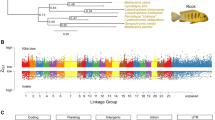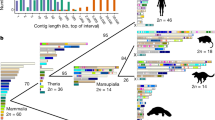Abstract
COMPARING protein polymorphisms in 24 species of invertebrates and 22 species of vertebrates, Selander and Kaufman1 observed greater genetic variability on average in the invertebrate than in the vertebrate by three criteria: number of polymorphic loci (25–50% in invertebrates compared with 10–20% in vertebrates); mean heterozygosity per locus per individual (15% compared with 6%); and, average number of alleles per polymorphic locus (three compared with two). I have found that amphioxus, a fish-like protochordate, combining vertebrate characters (such as dorsal neural tube throughout life) and invertebrate characters (such as solenocytic protonephridia) resembles, in its enzyme variability, invertebrates rather than vertebrates.
This is a preview of subscription content, access via your institution
Access options
Subscribe to this journal
Receive 51 print issues and online access
$199.00 per year
only $3.90 per issue
Buy this article
- Purchase on Springer Link
- Instant access to full article PDF
Prices may be subject to local taxes which are calculated during checkout
Similar content being viewed by others
References
Selander, R. K., and Kaufman, D. W., Proc. natn. Acad. Sci. U.S.A., 70, 1875–1877 (1973).
Kelly, O. E. S., University of Queensland Papers, Zoology, 2, No. 13, 259–265 (1966).
Manwell, C., and Baker, C. M. A., in Hormones in Development (edit. by Hamburgh, M., and Barrington, E. J. W.), 233–248 (Appleton–Century–Crofts, New York, 1971).
Manwell, C., and Baker, C. M. A., Molecular Biology and the Origin of Species (Sidgwick and Jackson, London, 1970).
Shaw, C. R., and Prasad, R., Biochem. Genet., 4, 297–320 (1970).
Avise, J. C., and Selander, R. K., Evolution, 26, 1–19 (1972).
Bailey, N. T. J., Statistical Methods in Biology (English Universities Press, London, 1969).
Ayala, F. J., Hedgecock, D., Zumwalt, G. S., and Valentine, J. W., Evolution, 27, 177–191 (1973).
Grove, A. J., Newell, G. E., Carthy, J. D., Mercer, E. H., and Newell, P. F., Animal Biology, eighth ed. (University Tutorial Press, London, 1969).
Young, J. Z., The Life of Vertebrates, second ed. (Clarendon, Oxford, 1962).
Selander, R. K., Yang, S. Y., Lewontin, R. C., and Johnson, W. E., Evolution, 24, 402–414 (1970).
Gillespie, J. H., and Kojima, K.-I., Proc. natn. Acad. Sci. U.S.A., 61, 582–585 (1968).
Gillespie, J. H., and Langley, C. H., Genetics, 76, 837–884 (1974).
Ferguson, K. A., and Wallace, A. L. C., Nature, 190, 629–630 (1961).
Author information
Authors and Affiliations
Rights and permissions
About this article
Cite this article
MANWELL, C. Enzyme variability in the protochordate amphioxus. Nature 258, 606–608 (1975). https://doi.org/10.1038/258606a0
Received:
Accepted:
Published:
Issue Date:
DOI: https://doi.org/10.1038/258606a0
This article is cited by
Comments
By submitting a comment you agree to abide by our Terms and Community Guidelines. If you find something abusive or that does not comply with our terms or guidelines please flag it as inappropriate.



